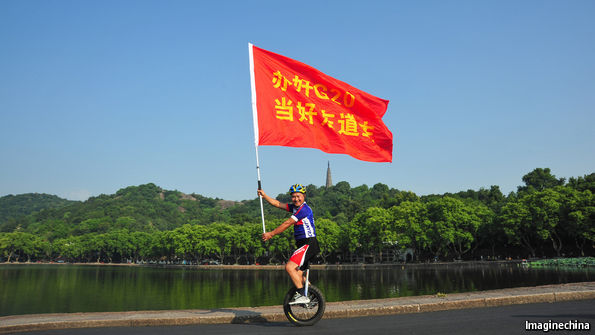Olympian exertions
All latest updatesNew roads and fake walls mean it’s summit time in China again

IF A Martian were to land on earth and be asked, based on effort put into spiffing itself up, which city was the Olympic host this year, there is a good chance it would guess Hangzhou. Rio de Janeiro struggled mightily with its preparations for the summer games, with mixed results. Hangzhou, by contrast, has left no stone unturned, no wall unpainted and no sewer unsealed in getting ready for the G20 Summit, an annual gathering of the leaders of the world’s 20 leading economies. Most hosts treat the G20 as a worthy, if rather dull, conference. But China has approached it with gusto, as is its wont with international events that let it showcase its modernity to the world.
Even if left in its original state, Hangzhou would surely have impressed visiting dignitaries and journalists. Just 40 minutes west of Shanghai by bullet train, it is one of China’s wealthiest cities. The misty waters of West Lake at its heart, fringed by rolling tea fields, have inspired poets for centuries. In recent years, it has become an entrepreneurial hub, most famously as the hometown of Alibaba, an e-commerce company.
But the G20 summit, to be held on September 4th and 5th, will be the first in China in the eight-year history of such meetings and a hugely important diplomatic occasion for President Xi Jinping. He clearly hopes that the event will highlight how central China has become to solving the world’s problems. (It will also involve what is likely to be his last meeting with Barack Obama before next year’s change of presidency in America, and may provide yet another opportunity to cosy up to Vladimir Putin of Russia.)
So the government is leaving nothing to chance. The city has plastered signs on lampposts and buses welcoming the G20 and exhorting residents to be on their best behaviour. Petrol stations alongside major arteries have been hidden behind new walls. Public offices will close for a special seven-day holiday. Private businesses have been urged to do the same, even though the summit itself only runs for two days. Hangzhou residents will receive 10 billion yuan ($1.5 billion) in tourism vouchers to visit other cities in Zhejiang province (of which Hangzhou is the capital) during the G20.
The city has also mobilised its masses. The mayor boasts that a 760,000-strong volunteer force stands ready to serve the G20. That number seems implausibly high for the summit alone, equating to a ratio of roughly 100 volunteers for every attendee. But it might just be true, if it includes all the students and retirees who will help patrol city streets during the meetings, whether to stop people from littering and jaywalking or simply to give visitors a smiling welcome.
For much of the past year Hangzhou has been a construction site, eliciting more scowls than smiles. Work crews have paved new roads, renovated hotels and completed a gleaming expo complex where the meetings will be held. With days to go, polluting factories around Hangzhou have already been ordered to halt production. Just as Beijing’s smog cleared up when it hosted APEC, another major economic forum, in 2014, so the skies over Hangzhou have turned unusually pristine in recent days.
Officials are sensitive to complaints about the cost of all this. One persistent rumour is that the city is spending 160 billion yuan ($24 billion) on the G20. If true, this would be remarkable, eclipsing Rio’s $5 billion expenditure on the Olympics. But Hangzhou says it is a lie: its entire municipal budget this year is only 120 billion yuan. Moreover, the local government has been adamant that it is not building new facilities for the G20. It notes that it broke ground several years ago on its new conference centre and that other infrastructure investments were previously planned, even if the schedule for their completion was accelerated.
Not all believe the official version. One man, identified only as Mr Guo, wrote an online post in July, titled “Hangzhou, I’m ashamed of you”. It criticised the government for wasting money and disrupting ordinary people’s lives. State media said Mr Guo deleted the post after it started to go viral, but the police detained him for ten days for “disrupting public order”. According to the government, only the tiniest minority would have agreed with him. An official poll found that 96.8% of Hangzhou residents were happy to host the G20. That is a level of support that few Olympic cities—Beijing in 2008 was a notable exception—have ever claimed.

No comments:
Post a Comment